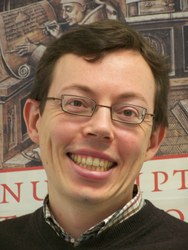Peter Van Nuffelen - MEPIHLA
Onderstaande beschrijving is in het Engels:

Peter Van Nuffelen’s most important publications include Orosius and the Rhetoric of History (OUP, 2012), Rethinking the Gods: Philosophical Readings of Religion in the Post-Hellenistic Period (CUP, 2011), and Un héritage de paix et de piété: Étude sur les Histoires ecclésiastiques de Socrate et de Sozomène, (Peeters, 2004). He has also published numerous articles as well as several (co-)edited volumes.
In 2011 he was Laureate of the Royal Flemish Academy in the Section Humanities; in 2012 he was awarded the Prix Franz Cumont by the Académie Royale de la Belgique; and in 2013 he was elected as a member of the Young Academy of Belgium - Flanders. Besides research stays in Oxford, Heidelberg, Geneva and Bonn, he has been Directeur d’études invité at the Ecole pratique des Hautes Etudes in Paris (2013), Fellow in Residence at the Göttingen Institute for Advanced Study (2012-2013), Professeur invité at the Université d’Angers (2011), and Margo Tytus Summer Fellow at the University of Cincinnati (2009).
Contact: Peter.VanNuffelen@UGent.be
Publications: publication list
Website: www.late-antique-historiography.ugent.be
MEPIHLA - Memory of Empire: The Post-Imperial Historiography of Late Antiquity
This project offers the first comprehensive interpretation and reconstruction of all historiographical traditions in the Mediterranean from the fourth to the eighth century A.D., the crucial transitional period from Antiquity to the Middle Ages. Including for the first time all languages and traditions (Greek, Latin, Syriac, Armenian, Coptic and Arabic) in a single study, it advances the hypothesis that the historiography of this period should be understood as ‘post-imperial’: the literary, cultural, and political traditions of the Roman empire remained the point of reference at a time when that empire had, by the seventh century, largely disintegrated. New realities were thus still understood and described with long-lived categories – a situation that generated both tensions and great creativity in the genre. In order to be able to test this hypothesis, the project makes new sources available, increases the accessibility of existing ones, and explores different methodologies.
Historiography is a key source for historical study of the period but research is seriously hampered by the absence of reference works, as well as by disciplinary divides that generate discipline-specific interpretations and obstruct the exchange of methodologies. This multilingual and multidisciplinary project will remove these obstacles, establish a new paradigm for our understanding of late antique historiography, and set the study of this field on an improved methodological footing. It has three objectives:
- A database takes stock of all histories produced in late Antiquity, including for the first time both fully preserved and fragmentary texts. It creates a research tool that has been lacking for decades.
- The second stage of the project aims at plugging gaps in scholarship, especially regarding fragmentary preserved traditions. Three clusters of detailed studies focus on early Byzantine local historiography, Syriac church history, and on fragmentary early medieval Latin historiography. Introducing two different approaches to the study of fragmentary historiographical texts, the project expands the range of methodologies and the awareness of their limits and advantages in late antique scholarship.
- The third stage articulates the general hypothesis. Drawing on modern theories, three key developments are singled out: the persistence and transformation of classical rhetoric in traditional and new contexts; the increased localisation of the past in objects and places, in tension with the subsistence of the idea of empire; and the continued cultural exchange between the various traditions and cultures of late Antiquity. These three elements produce tensions between a universal, imperial dimension and a local one, and between fidelity to the classical heritage and its transformation, tensions that are the hallmarks of a post-imperial literature.
Generating a substantially improved understanding of the genre as a fascinating yet consciously distorting mirror of its own times, the project will make a vital and groundbreaking contribution to the early history of Western and Middle Eastern society and to all the disciplines that study these societies.